9th March 2020,London, For Immediate Release
Phulbari Solidarity Coalition
- Controversial London-listed mining company GCM have postponed Tuesday’s AGM again, with less than 24 hours notice, citing “security concerns”.
- Communities in Phulbari have demonstrated in the town centre on Monday morning opposing GCM’s London AGM.
- Due to sudden AGM postponement, angry transnational protesters in London will join the occupation of Imperial College London for Democratisation, Decarbonisation and Decolonisation from 11AM-12pm, and discuss how to respond.
- Bangladesh Deputy Energy Minister confirms that GCM has no valid license or asset in the country, and claims that the government will be taking legal action against them.
GCM Resources have on Monday issued this statement postponing Tuesday’s AGM indefinitely again, citing “security concerns” of the venue. This is the second time that the London-listed company have cancelled their AGM in three months, citing security concerns. Last December’s meeting was cancelled 36 hours before it was due to take place, also citing security concerns1. In Phulbari and London, communities are angry because of GCM’s decision to postpone the AGM, which they say, is becoming an institutional habit. GCM’s last minute cancellations indicate that it has scant regard for its investors.
Dr Rumana Hashem, the Chair of Phulbari Solidarity Coalition and an organiser of the London protest said:
Never heard of any other London-listed company to adjourn AGM so abruptly and repeatedly. GCM failed their shareholders last December by postponing AGM with 36 hours notice. They did not hold their 2019 AGM. A second postponement in three months, and at such short notice, means that London Stock Exchange now needs to investigate whether GCM is in breach of the law. What does the company have to hide, postponing their AGM for a second time, with less than 24 hours notice and again citing “security concerns”?
Dramatic protest and picket have been organised by the Phulbari Solidarity Group (1) alongside a wide coalition of organisations at the AGM of the AIM-listed mining company GCM Resources Plc on Tuesday as it has no viable asset to its name, and has not held a license for coal exploration or mining in Bangladesh since 2006. Instead of picketing at GCM’s AGM, for what would have been the 11th consecutive year, campaigners will now meet at the Imperial College London to discuss how to respond to GCM’s latest move, and will join the occupation for Democratisation, Decarbonisation and Decolonisation of the University from 11AM to12pm.
In Bangladesh, angry Phulbari communities have demonstrated in the town centre on Monday morning opposing GCM’s London AGM, and demanding trial of its officials, to withdraw flase cases against Phulbari community organisers, and full implementation of their six-point agreement with the government. The demo lasted for two hours amid a huge police presence. Communities are now organising a long-march from Phulbari to Dinajpur to be held on 30th March under the banner of the National Committee of Bangladesh to Protect Oil, Gas, Mineral Resources and Power-Port. The long-march will demand an end of speculation about whether GCM can obtain a license, to remove the GCM Resources office from Phulbari, and to take legal action against the company for fraud and harassment of Phulbari residents(3).
Professor Anu Muhammad, the leader of the National Committee to Protect Oil, Gas, Mineral Resources, Power and Ports of Bangladesh said:
“People’s resistance against GCM is still strong despite an environment of fear and surveillance. GCM’s fraudulent and illegal business must be stopped immediately by delisting it from the London Stock Exchange to stop its continuing manipulation and corrupt attempts at coal mining along with Chinese companies, its harassment of community leaders, and preparations for violent crimes against people and environment in the form of open cast coal mining and displacement.
On 26 August 2006 three boys were shot dead, and more than two hundred injured by paramilitary forces in a peaceful demonstration of 80,000 people against the mine.(4) Annual ‘Phulbari Day’ rallies have been held every year in Phulbari and across Bangladesh, commemorating the deaths and protesting the company’s continued plans. Recently, GCM’s CEO Gary Lye has filed multiple cases against 26 community organisers in Phulbari claiming he has felt ‘harassed’ when he visited the area in an attempt to continue coal mining plans in 2014. Lye demands $2.6million as his compensation from the community representatives who stopped him.
In August 2019 the Deputy State Minister for Power, Energy and Mineral Resources, Nasrul Hamid, made this statement to the daily Prothom Alo newspaper:
“Even in the absence of an agreement, GCM or Asia Energy is trading shares in London by providing information that coal would be extracted from Phulbari, which is false. The government has taken this into notice. The government is proceeding to take legal action against them .”
He stated that the Prime Minister Sheikh Hasina’s clear instructions are that the government has no plans to extract coal from Phulbari, and the future extraction of coal would only be considered if any advanced and environmental mining or coal burning technology emerged.
Media contacts
To organise statements or interviews with any of the host organisations or case studies, contact:
Lydia James, London Mining Network: 07928443248, lydia@londonminingnetwork.org
Darren Gens, Phulbari Solidarity Group: 07309 556334, phulbarisolidaritygroup@gmail.com
Notes to Editors
GCM Resources (then ‘Asia Energy’) listed on the Alternative Investment Market (AIM) of the London Stock Exchange in 2004, following the granting of a two year permit (license) from the Bangladesh Energy Department’s Bureau of Mineral Resource Development on 27 January 2004 for exploration and surveying of a 572 million tonne open cast coal mine at Phulbari in Dinajpur, Northwest Bangladesh. A Scheme of Development was submitted to the Government of Bangladesh in 2005 but has never received approval. The permit expired on 27 January 2006 and has not been renewed, yet the company has continued to sell shares and raise capital in London based on claims that a contract will be forthcoming. GCM Resources has no other assets or projects in its portfolio.3
Phulbari communities maintain that GCM is responsible for the murder of three young boys and 200 injured in a 2006 demonstration. In December 2019 they handed a memo to Prime Minister Sheikh Hasina (who is also Bangladesh’s Minister for Energy and Mineral Resources) via the UNO, asking her to take legal action against GCM immediately.
Case studies and photos from protests in Bangladesh are available.
- Phulbari Solidarity Group (PSG) is a transnational activist network which exists to support and represent the communities located within the Phulbari region and across Bangladesh in opposing the plans for coal mine.
- The London demonstration was due to be co-hosted by London Mining Network, Reclaim the Power, Labour Campaign For Human Rights, Global Justice Rebellion, Committee to Protect the Resources of Bangladesh UK Branch, XR Youth, XR Internationalist Solidarity, Christian Climate Action.
- London Mining Network (LMN) is an alliance of solidarity, human rights, development and environmental groups. We work to support communities negatively affected by the operations of London-based and London-funded mining companies.
- See more information on the Phulbari massacre, challenging the invalid contract under Bangladesh’s energy policy, and facts about Phulbari coal project












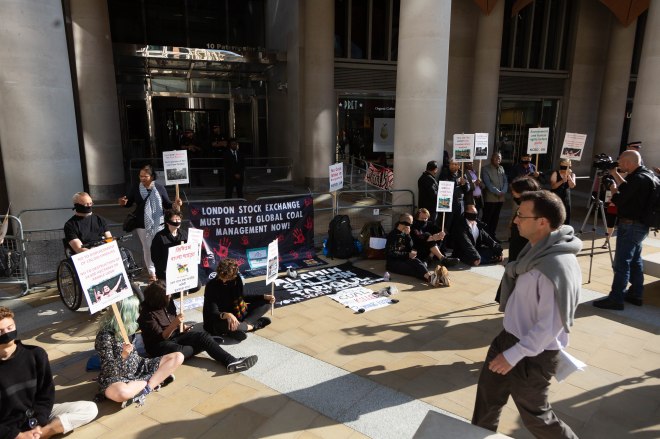
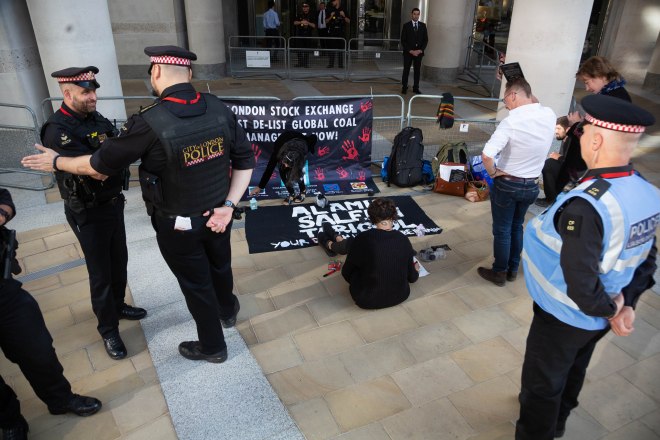


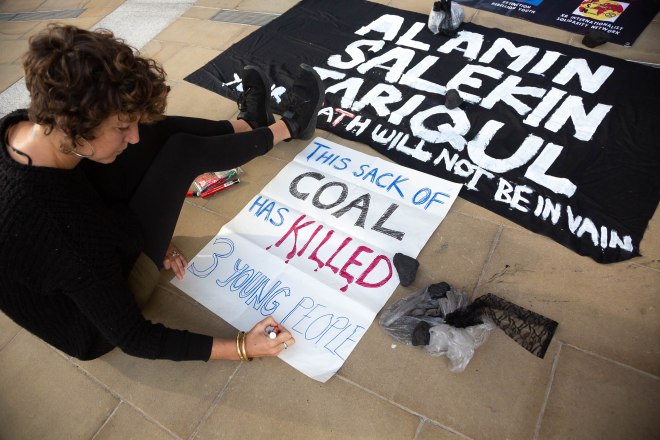
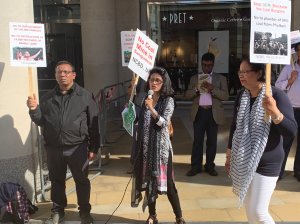



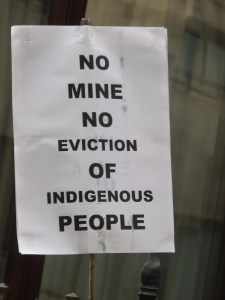
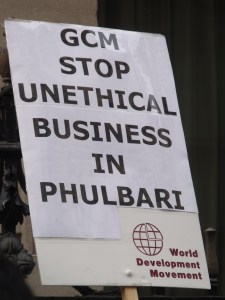
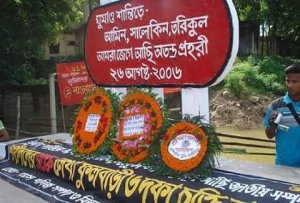





You must be logged in to post a comment.